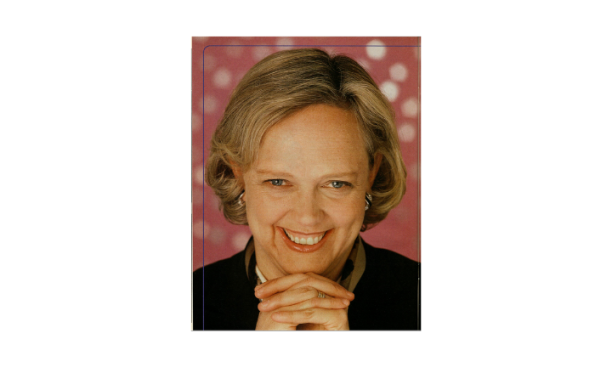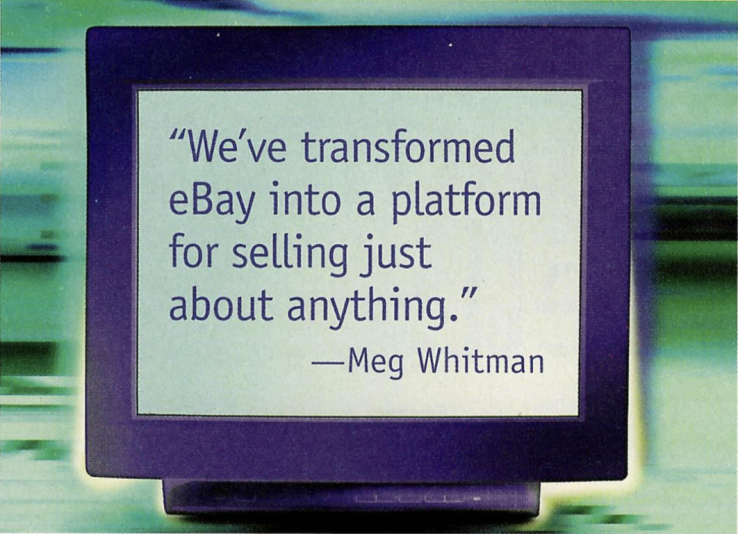
Imagine people setting up little booths in Jadwin Gym to sell items of one kind or another to a huge flow of people streaming through the doors. Its huge cavernous space is packed with booths. Instead of the house that Bill Bradley built, Jadwin becomes known as the place that sells everything, and then some. Buyers can pass magically through connecting doors to other Jadwin Gyms full of booths across the world.
Meg Whitman ’77, president and CEO of eBay, the world’s leading person-to-person online trading community, is explaining her company in a Princeton context. She continues: “eBay collects a small fee as the booth proprietors enter, then a small percentage of any sale they make.” Of course, Jadwin isn’t large enough to hold the 10 million buyers who are currently registered on eBay, and the 3.7 million items in 2,900 categories on display, with new items being added at the rate of 400,000 a day. More than half the items listed on the site sell.
It doesn’t require a Harvard M/B/A/ to understand that sellers want to be where the most buyers are, and buyers want to go where the most sellers are. What eBay, and its founder, Pierre Omidyar, managed to figure out was how to use the Internet to connect them. Some 1.78 million people visit daily, making eBay the most popular site on the Internet, ahead of number two, Amazon.com, with 1.13 million. Whitman says it’s even better than that: eBay creates community – it brings people together. People meet each other. Have fun. eBay provides a personal service.
Whitman may not have founded eBay, but she’s as enthusiastic as any Web visionary when she talks about the company she joined in early 1998. “It doesn’t get any better than this – I have the world’s greatest job,” she says.
For Whitman, the magic of eBay, and the secret behind its incredible growth, is the bond the site creates between the buyer and seller.
“The strength of this company is its emotional connection,” she says, standing by a blackboard in a conference room at eBay’s headquarters, a sprawling brick complex in San Jose, California. The surrounding office is quiet, a warren of cubicles that keep replicating themselves as the company keeps growing. eBay just expanded into its sixth building in the complex. “As one example, fraud is practically nonexistent, but we do have occasional problems, like the time a woman won an auction for a computer. She sent a check for $900, but she never got her computer. We paid her the $200 insurance we provide for free, and she was profiled on Dateline. Within 24 hours, we had 6,000 e-mails offering $25 each. Five thousand dollars came in; we bought her a new computer and donated the rest to charity.
“eBay empower people as entrepreneurs,” Whitman continues. “They quit their day jobs – a truck driver who loved collecting Hot Wheels quit and now sells full-time on eBay. We have thousands of single mothers, disabled people, and senior citizens supporting themselves by selling on eBay. Art dealers no longer need showrooms and expensive inventory space. eBay is also a real meritocracy – you can’t see people who are disabled, or how they dress, or whatever. We are an unbiased marketplace – we make the fewest rules and then get out of the way. Everywhere I go, taxi, airplane, people know eBay.”

The so far short, happy life of eBay started famously as the brainchild of Omidyar, a computer engineer whose fiancée collected Pez dispensers. When she complained about the difficulty of finding other similar-minded collectors, Omidyar was inspired and set to work designing an Internet auction site, which he launched in the fall of 1995.
eBay was an instant success, and sooner than he could have dreamed, Omidyar was looking for money and help to grow the company. By 1997 he had his money, and he found his CEO a year later in Whitman.
Whitman’s warm, dimpled smile belies her role as a boss hired to bring adult supervision – based on her experience in management and marketing at Disney and at Hasbro – to a youthful startup. And yet she projects energy and authority, occasionally writing and drawing to illustrate her points. She is smooth, composed, confident – the demeanor of a veteran.
One of Whitman’s first tasks at eBay was to prepare the company for its initial public offering. When eBay went public in September of 1998, rising from $18 to $47 per share in a single day, the value of her stock options catapulted to a billion dollars.
“People thought I was out of my mind to leave my job at Hasbro,” she says. “I was running their $600 million preschool division, making a ton of money. Let’s try leaving two jobs – my husband, Griff Harsh, a neurosurgeon, was the director of the brain-tumor center at Massachusetts General Hospital. I came because I thought the Internet was going to change everything. I saw that eBay had an emotional benefit as well. I saw it as a community, a great opportunity for a great brand.”
Viewers spend an average of one hour and 45 minutes on the eBay site each month, compared to Amazon visitors who spend an average of 13 minutes. Those are statistics to die for in the cluttered and cluttering world of e-commerce. Whitman says that loyalty comes from a feeling of ownership.
“Users feel like they have a real say in the direction of the community,” she explains. “If a buyer doesn’t like the way a seller behaves, he says so in our public forum. Future potential buyers can check out a seller’s rep, and the other way around, too. We’re a part of people’s lives.”
Though eBay originally started with collectors, and “they’re still the heaviest users today,” according to Whitman, “we’ve transformed eBay into a platform for selling just about anything. This is the place to find sports equipment – yesterday, we listed 1,500 golf items. We’ve opened up a car site – 3,000 cars, 12,000 motorcycles, and 13,000 car parts. When I was in Washington, D.C., recently, Senator Kerrey tested me by asking if eBay had any of his favorite Puck cartoons. Sure enough, we listed 27 Puck cartoons. Someone else wanted to see antique poker chips. Turns out we had a lot of those: 2,700.”
In the fall of 1999, eBay bought auction house Butterfield and Butterfield, and set up eBay Great Collections as a first foray into a higher-end market. In January, the 17th-century old master’s painting by Jean Le Clerk, The Adoration of the Shepherds, was auctioned online with an opening bid of $60,000. The company set up specific trading sites for small businesses to buy and sell office products and equipment. It also has several regional U.S. sites and country-specific sites, including its newest site in Japan.
“We want to expand our international business and create a global marketplace. The international market will be triple the size of the U.S. market. We have users in over 200 countries already,” Whitman says, “but people like to buy and sell in their own language and area. eBay is in English. Our ultimate goal is to list in German and have it automatically translated into English. The technology doesn’t exist yet to do that.”
eBay has had some forgettable moments. Its temporary shutdowns – one last summer lasted 31 hours, during which Whitman slept on a cot in her office – made headlines and sent investors scurrying. Body organs and military weapons have popped up for sale before eBay nixed them. Recently, a teenage boy listed his soul.
The competition, too, is keener as other companies have developed auction sites. Whitman relies on eBay’s sense of community and eBay’s brand name to prevail. “We’ve become part of the pop culture of this country. Amazon and the others can’t lift off in comparison,” she declares.
eBay has another advantage over many Internet companies: It’s actually profitable. Although this has been true for eBay from the beginning, it’s also a credit to Whitman, who has imposed her corporate outlook – that is to say, a realistic business plan focused on the bottom line – on the company. eBay’s profitability has also made it the subject of merger talks recently: At this writing, a union with Yahoo! Is rumored.
Whitman’s long days begin with a run on the treadmill at 5:30. Family time with her two teenage sons is spent skiing and on a family farm in Tennessee. Originally from Long Island, she came to Princeton to become a doctor. She took a chemistry course, but “I was hugely successful at selling ads for Business Today to the likes of Johnson & Johnson, AT&T – for a little sophomore to go in and sell ads at $2,500 a clip was not inconsequential. I’d make the presentation, close the sale – it was great fun!”
She chose economics as her major, writing a thesis on the marketing of American consumer products internationally. She also played squash and lacrosse. “I adored Princeton. I really grew up there. I learned how to write, how to be linear and logical about things. A corporate finance course under Uwe Reinhardt as one highlight. I remember thinking, he’s great, this is cool.”
Her future is, like eBay, virtual. “I’ve been here two years. I’ll be here another five to eight years, while it’s fun, while I’m adding value. As a company, eBay is on the five-yard line looking out.”
This was published in the April 19, 2000 issue of PAW.
